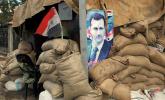 |
 |
The Assad Regime: From Counterinsurgency to Civil War
Mar 6, 2013 - Anonymous


Contact: Maggie Rackl
(202) 293-5550 x205
ISW’s latest report, The Assad Regime: From Counterinsurgency to Civil War, explains how the Assad regime lost its counterinsurgency campaign, but remains well situated to fight a protracted civil war against Syria’s opposition.
In his report, ISW Syria analyst Joseph Holliday analyzes how two generation of Assads have sought to control uprisings within Syria with deadly results. Hafez al-Assad subdued the Muslim Brotherhood uprising in the early 1980s through a counterinsurgency campaign that relied on trusted military units; by raising pro-regime militias; and by using those forces to clear insurgents out of major urban areas and hold those cities with a heavy garrison of troops. Bashar al-Assad attempted unsuccessfully to employ the same strategy in 2011-2012.
Pro-Assad militias have become the most significant source of armed reinforcement for the Syrian Army. The mostly-Alawite shabiha mafias are led by extended members of the Assad family and have been responsible for some of the worst brutality against the Syrian opposition. The local Popular Committees draw their ranks from minorities who have armed themselves to protect their communities against opposition fighters. Both types of militia coordinate closely with and receive direct support from the regime, as well as from Iran’s Islamic Revolutionary Guards (IRGC) and Lebanese Hezbollah.
Assad is unlikely to regain control over all of Syria, although he is well situated to continue fighting in 2013 and to prevent the opposition from taking over the rest of the country. Hopes of a clean opposition victory and a peaceful transition are therefore dim.
For media inquiries, please contact Maggie Rackl at [email protected] or at (202) 293-5550 x205.
###
The Institute for the Study of War (ISW) is a non-partisan, non-profit, public policy research organization. ISW advances an informed understanding of military affairs through reliable research, trusted analysis, and innovative education. We are committed to improving the nation’s ability to execute military operations and respond to emerging threats in order to achieve U.S. strategic objectives.